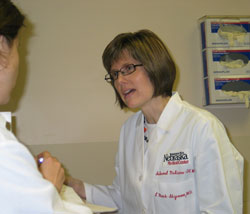 |
Lynn Mack-Shipman, M.D. |
Medical students, who do an endocrinology rotation during their third- or fourth-year in school and have the chance to shadow the UNMC associate professor, not only gain knowledge working with her, but also find a resourceful educator and reliable mentor.
A personable, hardworking professional, Dr. Mack-Shipman is a strong role model whose go-get’em spirit shines and reflects onto students.
“Dr. Mack-Shipman’s collegial teaching style, professionalism with patients and willingness to share her time make her an excellent educator and role model for students and residents. She was very accessible for questions and made time to discuss relevant topics in women’s health with me,” said fourth-year medical student, Laura Donigan, a former student of Dr. Mack-Shipman.
Today, Dr. Mack-Shipman will be recognized for her positive contributions to UNMC when she receives the 2007 Outstanding Teacher Award at the annual faculty meeting.
“Dr. Mack-Shipman sets a high standard for the commitment that faculty should give toward education,” said Jennifer Larsen, M.D, associate dean of clinical research in the College of Medicine and professor and chief of UNMC’s section of diabetes, endocrinology and metabolism. “Not only is she a good educator, but she challenges other faculty to do what she feels is integral to every faculty member’s job. She has been in the trenches providing education on a regular basis as we hope all of our faculty would provide.”
|
|
“Anything my older brother could do I was going to make sure I could do the same or better,” she said.
When she was about 6, her father was diagnosed with Type 1 Diabetes, which sparked her interest in medicine.
“I knew in high school that I wanted to go to medical school,” she said. “I was the first one in my family to graduate from college and I wanted a career where I could be happy doing something I felt was useful.”
During her UNMC residency, Thomas Gallagher, M.D., an associate professor of internal medicine, influenced her career path.
“Dr. Gallagher asked me if I would consider becoming an endocrine fellow,” she said. “I had a lot of interest in diabetes, so I happened to be in the right place at the right time and had a faculty mentor who took an interest in me.”
For the past 11 years, Dr. Mack-Shipman has been active in education on many levels. For three years, she has been the core director for UNMC’s fall course based around endocrinology, cardiology, pulmonary, ear nose and throat for second-year medical students. She gives two of the endocrine lectures for the course where she teaches calcium regulation and osteoporosis.
She also developed a women’s health elective for fourth-year medical students that incorporates working with internal medicine and gynecology faculty, as well as staff at the Domestic Violence Council in Omaha.
The classroom is a small portion of her teaching, Dr. Mack-Shipman said. Most of her teaching occurs in the clinic. A team of residents and students make rounds with her in the hospital, then discuss how to best help the patient.
During the fall, Dr. Mack-Shipman participates in small group discussions with second-year students, which she finds to be a great learning experience.
“You have to be able to discuss medicine from different perspectives,” she said. “That will be different with second-year students versus fourth-year students, so in that respect, I learn better ways to communicate with my patients because of my interaction with students.
“I try to show students that this isn’t ‘one-size-fits all’ medical care. I tell students they need to take into consideration what the patient wants to do and they need to listen to patients and work with them.”
At the end of the day, Dr. Mack-Shipman hangs up her white coat and heads home to spend time with her husband, Tim, and two children Annah, 12, and Sam, 9. Together, they walk their dog, Tovi, a little Bichon and make trips to the Joslyn Art Museum. They also enjoy biking around Memorial Park near their home.
Watching her students move progress through medical school is truly rewarding, she said.
“It’s gratifying to give somebody information and watch them mature and develop and use that information,” Dr. Mack-Shipman said.